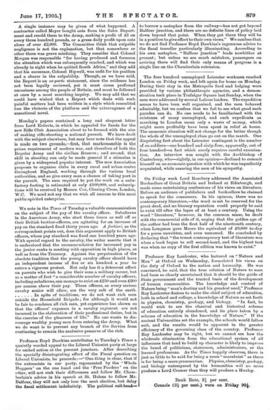We note in the Times of Tuesday a valuable communication
on the subject of the pay of the cavalry officer. Subalterns in the American Army, who start three times as well off as their British brother-officers, are agitating for an increase of pay on the standard fixed thirty years ago. A fortiori, as the correspondent points out, does this argument apply to British officers, whose pay standard was fixed one hundred years ago. With special regard to the cavalry, the writer asserts that it is understood that the recommendation for increased pay in the junior ranks is meeting with opposition in high places, as well as from the Treasury. Against the perpetuation of the obsolete tradition that the young cavalry officer should have an independent income of five or six hundred a year he enters a vigorous protest. Not only has it a deterrent effect on parents who wish to give their sons a military career, but as a matter of fact "a considerable number of cavalry officers; including subalterns, can manage to exist on £250 and even £200 per annum above their pay. These officers, as every serious cavalry senior will allow, are the very salt of the earth.
In spite of traditions, we do not want rich men outside the Household Brigade ; for although it would not be fair to condemn all rich men, yet experience has shown us that the officers expenses in a cavalry regiment are not incurred in the elaboration of their professional duties, but in the exercise of the pleasures of life." No one wants to dis- courage wealthy young men from entering the Army. What we do want is to prevent any branch of the Service from continuing to remain the exclusive preserve of the rich.






































 Previous page
Previous page